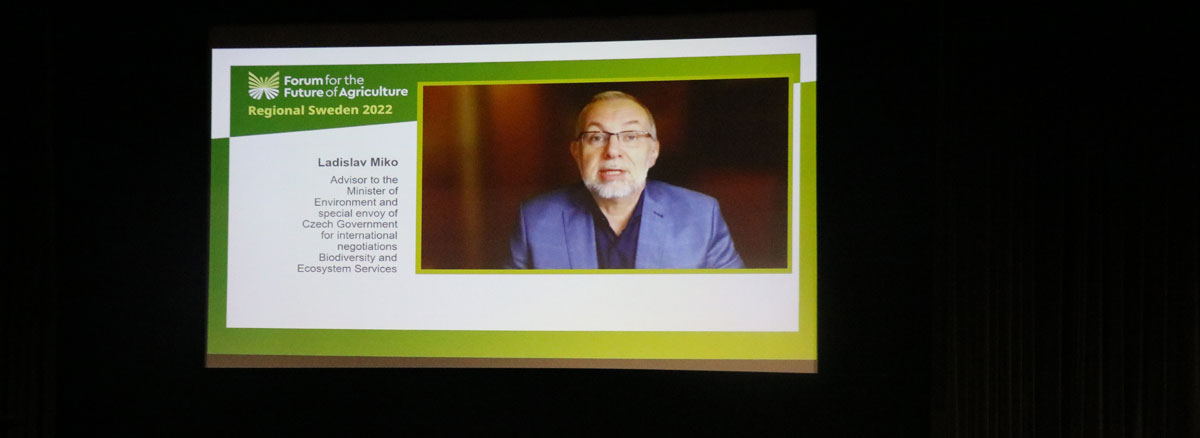2022 Regional Sweden – Introduction and opening address summary
2022 Regional meeting Sweden
Thursday, Dec 01, 2022
At the ForumForAg, Swedish Regional Conference on December 1, speakers and panellists examined the theme, “Food security and National Strategic Plans – how to deliver environmental targets”. All agreed on the crucial role innovation must play to achieve the different goals.
Gunnar Palme, President, Swedish Landowners’ Association, welcomed participants to the ForumforAg Regional Conference in Sweden. While the focus of the day-long event was agriculture, he said the location of the meeting meant forestry had also to be taken into account.
Mr Palme pointed to a major problem facing the sector: wood is in short supply since none is currently coming from Russia, yet the European Commission favours limiting the quantity of trees felled. This could lead to other materials being substituted for wood which is also “the only really renewable source” for producing power.
He called for a better understanding by authorities of agriculture’s importance and of its need to be profitable in order to invest in technical development and higher productivity. Ideas that would emerge during the day should be directed at the Commission, he suggested, to try and convince it to reconsider some of the policy decisions it had taken.
Janez Potočnik, Chair of ForumforAg 2022 and Chairman the RISE Foundation and Co-Chair of the International Resource Panel of the United Nations Environment Programme (UNEP) gave the opening address. He emphasised the crucial role natural resources play. They “provide the foundation for the goods, services and infrastructure that make up our current economic system”.
He noted that everything extracted from the ground had tripled since 1970. Without transformative change it will double by 2060 with the negative impacts largely hitting low-income countries. “In overusing the Earth’s resources and by distributing the benefits unfairly, our economic model is taking far more than the planet can sustainably give,” he warned. Having benefited from natural resource overexploitation, Europe is “ethically bound” to lead the necessary transition at home and globally.
Policymakers should abandon a narrow, silo approach and take into account different trade-offs, synergies and potential multiple benefits as they steer the transition of Europe’s economy, including farming and the food industry, towards a more sustainable future. This involves addressing “three major blind spots”: absence of a holistic system change approach to turn visions into concrete policies; failure to go to the root of problems to address the drivers and pressures; lack of focus on consumption and demand, with most climate policy concentrating on the supply side of the economy.
A full-scale system change is required if climate and biodiversity targets are to be met and economic growth to be separated from ever rising demand for resources. This requires moving “from an economy considering humans as external and superior to nature, to an economy acknowledging that we are embedded with nature”.
Mr Potočnik said that UNEP’s next Global Resources Outlook in 2024 would redefine sectors as systems, focusing on those that provide associated human needs like nutrition, mobility, shelter, essential consumer goods, water and energy. This would allow cross-sector innovation and a more future fit business model.
He stressed the fundamental pressures driving the transformation. “Changing our relationship with natural resources, with nature, is ultimately an economic, security and resilience imperative.”
A full version of Janez’s speech can be found here.
COP 15 and biological diversity
Ladislav Miko, Advisor to the Minister of Environment and special envoy of Czech Government for international negotiations Biodiversity and Ecosystem Services, sent a video message from Montreal where he was leading the EU presidency representation at COP15 – the 15th Conference of the Parties to the United Nations Convention on Biological Diversity.
He began by reminding the audience of the outcome of the recent United Nations Climate Change Conference (COP 27) in Sharm el-Sheikh. The EU had helped to create a new fund, financed by voluntary contributions, for the world’s most vulnerable states. Over 150 countries had also adopted the Global Methane Pledge to reduce global methane emissions by at least 30% from 2020 levels by 2030.
The aim of COP 15, he explained, was to agree a global framework for biodiversity after 2020, akin to the 2015 Paris Agreement on climate change. The EU is looking to protect 30% of land and sea around the world and to put stronger emphasis on restoring biodiversity and protecting ecosystem services.
Also under discussion are targets to reduce the spread of invasive species by 50% and minimise their impact, reduce the loss of nutrients in the environment by at least half and to tackle plastic waste. The EU would like to cut harmful subsidies with a negative impact on the environment by some $500 billion a year and increase annual finance for biodiversity and ecosystems by at least $200 billion.
“I want us to agree on a global biodiversity framework at the end of the year…because it can make life on this planet better for all of us,” he said.
Click here to view videos from the Sweden event.
Click here to view the agenda and speakers bios from the Sweden event.



